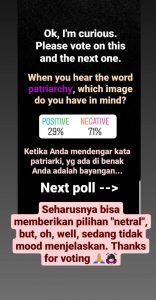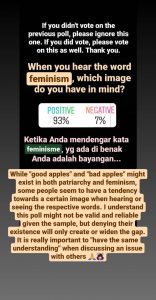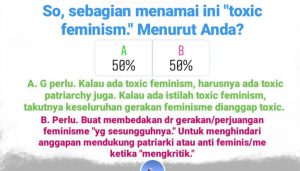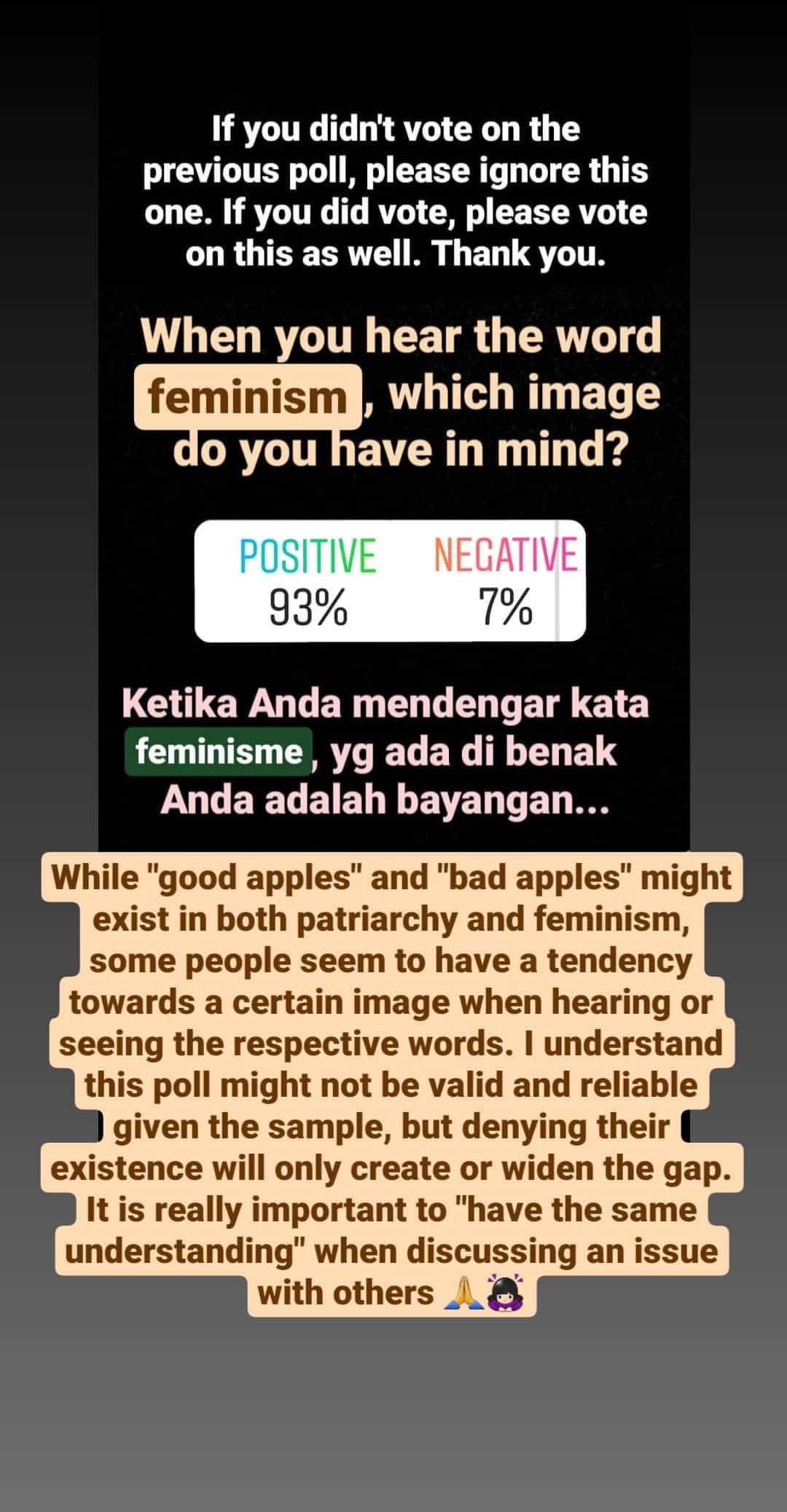The other day a friend of mine, a colleague, wrote this status on Facebook about his student’s essay telling about how the movement of feminism tends to show women’s superiority and demanding for privileges instead of supporting gender equality. He said that her essay concluded with a statement that said that such tendencies, in fact, inevitably show women’s weaknesses and are prone to being made a commodity such as gender exploitation.
This is not new to me so I commented because I thought it’s interesting. Besides, I had heard of toxic feminism before so I wondered if that was the case and that some people were in denial of its existence. And so I wrote such comments, to which he replied that it’s exactly what his student termed in her essay.
All was well until one of my seniors replied to my comment. She is one of the people I admire in college. She is a debater. She is smart and has this vibe as a strong woman. One you don’t want to mess with. She’s so cool.
Without further ado, I’d just copy-paste our correspondence in the comment section, and give some comments on it. I’d told her that I’d use this for my blog.
Her: There is toxic feminism, but there is also toxic patriarchy. Both can show the weaknesses of each gender and the stereotype exploitations. The door opens to both sides. I hope the writer said something about it, otherwise he/she does not show some justice in the essay.
Me: “Toxic patriarchy” is new to me, ’cause usually patriarchy by itself is considered toxic already o.O
Her: Exactly! How come we dont call a spade a spade? People are comfortable with the term toxic feminism, should be comfortable too with toxic patriarchy.
 I was actually confused because in no way I was defending patriarchy. I was just trying to understand why some people might feel the need to use toxic with feminism but not with patriarchy. And to be honest, I really didn’t want it to turn into a debate, because I was simply not good at it, not to mention that I was often misunderstood because often times I couldn’t quite say what I meant properly. But I replied anyway.
I was actually confused because in no way I was defending patriarchy. I was just trying to understand why some people might feel the need to use toxic with feminism but not with patriarchy. And to be honest, I really didn’t want it to turn into a debate, because I was simply not good at it, not to mention that I was often misunderstood because often times I couldn’t quite say what I meant properly. But I replied anyway.
Me: Ah, I think I get your point. I was thinking, when people hear patriarchy, they already associate it with toxicity, i.e. even without the word toxic, all of it is already “negative.” But when people hear “feminism”, it’s actually positive, but some want to point out that not all of it is positive, some is negative, hence call that part toxic feminism. Maybe that’s what they mean? O.o
Her: I can’t agree with that. Feminism does not automatically conjure a positive image. Patriarchy does not automatically conjure a negative image.
Well, I completely agree with her. She says the truth. The problem is, that’s not how everyone sees it.
Me: Ah, that’s why. I see.
I actually agree with you, but when I read people talking bout patriarchy vs feminism, they always make it about feminism fighting patriarchy with feminism being the hero and patriarchy the villain. Maybe I should read more 🙏🙇🏻♀️
Her: Well I think they are somewhat each other’s enemy. I haven’t read that much either about feminism. But with my limited knowledge, feminisim doesnt fight for gender equality because we dont even know thats possible. Can you imagine with perfect gender equality, there will be many children not raised properly because their fathers just cant do it. What feminism wants is acknowledgement. The acknowldegment that men have more innate advantages to be successful. The advantages can be from biology, social construct, culture, religion, history, etc. Men get more advantages, women get more disadvantages.
I agree with her, but I still found it surprising because some of my friends who claim to be feminists say exactly the opposite, i.e. feminism fights for gender equality. So, I said:
Me: This is one perspective of how someone might understand feminism. But I am curious, let me make a poll on my Instagram. 🙈😅✌️ (This part is actually partly translated from Indonesian, and will do so for the rest.)
Her: but dont expect all men to understand that. There is an important quote I got, PRIVILEGE IS INVISIBLE TO THOSE WHO HAVE IT.
Again, I don’t disagree per se.
Me: Nah, my focus is not on the men themselves actually. I’m curious about the women, especially those claiming to be feminists. I’m curious about how they understand feminism itself.
 Well, it’s because people often think “men are trash”, right? So what they say doesn’t really matter. If men misunderstood or misinterpreted feminism because it calls them out, then it’s no surprise. What I am concerned about is how women themselves understand what feminism is.
Well, it’s because people often think “men are trash”, right? So what they say doesn’t really matter. If men misunderstood or misinterpreted feminism because it calls them out, then it’s no surprise. What I am concerned about is how women themselves understand what feminism is.
Her: Dont clickbait them with the term feminism in the poll. Just ask, do they feel somehow the situation is not fair? If the answer is yes, then they are already a feminist before they even know it.
Later, she adds, “You can use any word you want heheheh. It’s your poll. It was just a suggestion.”
I understand her concerns. But this is exactly my goal: to know how they understand the word or the term feminism. It’s because, I’m sure they feel unfair somehow, which makes them a feminist (according to her), but when they are asked if they support feminism some of them might say no, which indicates their misunderstanding of feminism. This is what I want to find out, or rather show, or maybe prove? I don’t know. But I’m really concerned about this. Often, people are against something simply because they actually misunderstand it, when in essence they actually support it.
Me: Well, already did. 🙇🏻♀️🙏✌️ I’m interested in what u said, about patriarchy doesn’t necessarily conjure a negative image, n feminism a positive image. Because seriously, when we talk bout that topic, patriarchy will be immediately thought as negative. 🙈😅✌️ And about “doesn’t fight for gender equality”, seriously, I often read that it’s exactly what they’ve been fighting for 🙈😅 That’s why, your perspective is interesting, but I don’t think everyone has the same understanding. Indeed, this different understanding somehow can lead to or cause either anti feminism or “toxic feminism”. Imo
You might notice that I used emoticons a lot. It’s because, really, I didn’t want her to think that I was fighting her or such, because really, I wasn’t. I was worried about being misunderstood.
Her: Okay. But anything extreme can be toxic, even our own antibody. Hehehe. So I think it’s a bit strange to underline that there’s a toxic part of feminism when everything in this world can be toxic. It’s like Hello, there’s nothing new here.
I got her point; but I just wanted to understand why such terminologies exist. I wasn’t trying to argue why such terminologies should/not exist. Like, for example, using her logic, if it’s considered unnecessary to use the word toxic because everything can be toxic, will it then be unnecessary too to use the term “toxic positivity”? So, I said,
Me: That’s for sure. Maybe that term came up partly because there is no one who underlines that there’s sth good in patriarchy, like, do we have positive patriarchy? I have never heard of it o.O
Her: If people dont consider patriarchy good, why does it survive for thousands of years? Why do societies enforce it? Who do people teach it?
If I hadn’t known her better, I’d taken it that he was defending patriarchy. But I believed she wasn’t. Like, why would she be saying that patriarchy is good? She was just trying to make a point. So, I tried to counter.
Me: If people consider patriarchy good, why do some people feel the need to fight it (with feminism)?
Her: You already have the answer, “some people feel the need to fight it.” Just some, not all.
I was intrigued at this point. I could’ve said something like, “So you’re saying that these some people that feel the need to fight patriarchy are wrong because “patriarchy” has been good and preserved for ages?” But, well, again, I wasn’t here to debate. I was just trying to understand. And I know that’s not her point. So I said,
Me: I know. Which is why I find it intriguing. These “some people fighting patriarchy” are usually seen as positive, while those people considering patriarchy is good are usually seen as negative. Btw, I’m just curious about the terminologies and the images people have of each 🙈😅✌️ I mean, somehow I feel that not everyone has the same understanding like you do 🙇🏻♀️🙏
At this point I felt like she has misunderstood me so I felt the need to write what I meant again and again.
Her: I thought you were wondering if patriarchy always conjures a bad image. I personally think thats not true. Many people love the idea of patriarchy. They enforce it for millenia, they preserve it, they teach it, they live it.
Me: Yes, I was. Well, at least that’s what the poll temporarily resulted in 😐 Too bad the poll could give only two options :'( Because when I saw people debating, I was often thinking, “Do they have the same understanding of feminism and patriarchy?” Because if they misunderstood the terms at the first place, like one is sure to fight for gender equality when the other “only” wants acknowledgment, then they’re not gonna “meet” 🙈😅
Her: Another thing is surely related. Who doesn’t want gender equality, if it’s possible? Hehehe. The problem is, is it attainable or not? Hence, wanting acknowledgement implies something. If men acknowledge that they have been advantaged/privileged, what is the implication?
Me: I know. That’s why. I think it’s important to “have the same understanding.” There are some people who are anti feminism because they think “feminism=hating men”, while from our discussion, that’s not what it means, right? Cmiiw
Her: Okay. It reminds me of the draft of the family resilience bill. Those who proposed it loooove patriarchy. Five politicians, three of them are women.
I don’t understand why she brought this up to me. It’s not as if I was supporting the bill/draft. The draft of the family resilience bill wants women to stay home, do domestic work, and such, which is so patriarchal and against what feminists have been fighting for. Me trying to understand why people use the term toxic feminism doesn’t mean I’m saying that the whole feminism is toxic. Not at all. So I really wasn’t sure why she said all these things to me. I replied, anyway.
Me: I don’t know bout you, but I find it ridiculous. I think I posted bout it before 😐
Her: Blatantly is.
I stopped replying because I thought there was no point to continue the discussion, which felt a bit like debates to me. Perhaps because I wasn’t used to debating. Besides, I got her points and I didn’t disagree at all. However, I felt like she didn’t understand what I meant.
I reflected on it, though, as to why she was so adamant about how it was unnecessary to use the term toxic with feminism. Then it dawned on me. Perhaps, she was worried about the impact of its use (the word toxic) on the whole movement of feminism. For instance, when people hear the words “toxic feminism,” they might think that the whole feminism is toxic. And we know this is not true. Maybe that’s what she was worried about. I didn’t confirm this to her, though, ‘cause I was scared of falling into unnecessary debates, and I don’t think I have the time to explain myself that well. But that’s why I’m writing here. I’m just guessing. And seeing it this way, I kinda understand her concerns.
However, from my perspectives-in trying to understand why people use the term toxic feminism-I think some people use the term toxic feminism because they don’t want to be considered supporting patriarchy or against the whole movement of feminism when trying to criticize a part of feminism that they consider toxic. I think by using the term, they’re trying to say something like, “Look, I am not defending patriarchy and I do support feminism, but I don’t like this toxic part of feminism.” Something like that? At least that’s how I understood it. I wonder if she understood it differently. But again, I couldn’t bring myself to ask her that because I don’t want to be falling into unnecessary debates and having to explain myself again. I just can’t make time for that.
 But I made a poll about that, about whether it’s necessary or not to use the term “toxic feminism” with the respective reasons I explained above. My respondents were not so many so I cannot say it’s reliable. I guess my followers tend to avoid voting in a more serious poll or a sensitive issue like this one. But, well, the result is 50:50; i.e. there are those who think we need to use the term toxic feminism and those who think we don’t it, for the reasons I explained in the previous paragraph.
But I made a poll about that, about whether it’s necessary or not to use the term “toxic feminism” with the respective reasons I explained above. My respondents were not so many so I cannot say it’s reliable. I guess my followers tend to avoid voting in a more serious poll or a sensitive issue like this one. But, well, the result is 50:50; i.e. there are those who think we need to use the term toxic feminism and those who think we don’t it, for the reasons I explained in the previous paragraph.
But, again, I need to emphasize how important it is to have the same understanding. To try to understand why people think the way they do instead of immediately judging and saying that they are wrong or that they shouldn’t think that way.
For example, sometimes I find some women with a master’s degree, even doctoral or PhD, campaigning for anti-feminism movement. And I think it’s ridiculous, why? Because, they wouldn’t have been able to get all those titles without feminism. Without feminism, they wouldn’t have been allowed to go to school or pursue a higher education at all. They wouldn’t be allowed to speak in such forums at all. Chance is women would be just staying at home. So how can they say they are against feminism when they have actually benefited from it? Here, I don’t think it’s wise to directly fight them without having a proper dialogue with them, terminologies put aside. It’s because I believe that they’re not anti feminism per se; I believe that they simply misunderstand what feminism is. They might dislike some parts of feminism, those that they might consider toxic, but I believe there are some parts of feminism that they also support or agree with. And, I think this should be our focus. We need allies, not enemies, right? Hence, we should help more people to understand it. If we blatantly accuse them saying they are stupid, we’ll only get more retaliation and such. And I guess it’s not good.
So, well, back to the title of this post, is the term of toxic feminism necessary? Honestly, I don’t know. It might depend on which perspectives and reasons we have. I’m not an expert at feminism myself, but I just don’t want people to judge and misunderstand each other. So, is it necessary? Well, you decide it yourself.


